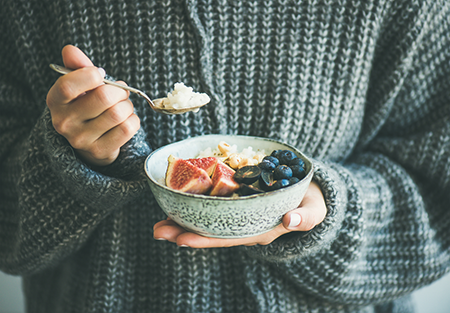 Healthy food choices and a balanced diet are important for every person. Choosing a variety of healthy foods from different food groups helps you get the nutrients, vitamins, and minerals your body needs.
Healthy food choices and a balanced diet are important for every person. Choosing a variety of healthy foods from different food groups helps you get the nutrients, vitamins, and minerals your body needs.
In some cases, women can have specific nutrient needs too. And, as you age, the amount and types of these nutrients may change. If you’re unsure about your specific needs for women’s health, talk with your OB GYN. He or she can guide you on the nutrients that are especially important through each stage of a woman’s life.
Calcium
Calcium is an essential nutrient to support bone health—along with vitamin D. It can be found in dairy products, calcium-fortified items like orange juice or cereals, and leafy green vegetables. You need a certain amount of calcium at every age. However, young women under 18 and post-menopausal women may particularly focus on their calcium needs.
The Office on Women’s Health says pre-teens and teens should aim for 1,300 mg of calcium a day. At this age, the bones absorb calcium that will support bone strength in the long term. Women who are past menopause need around 1,200 mg. This helps reduce the risk of osteoporosis—a weakening of the bones that’s more common as you age.
Iron
Iron helps your red blood cells carry essential oxygen throughout your body. When you don’t have enough iron, it’s known as iron-deficiency anemia. Due to factors like menstruation, pregnancy, and breastfeeding, women are more likely to develop anemia than men.
You can get iron through food choices such as meats, poultry, fish, whole-grain bread, peas and beans, oatmeal, and some leafy greens. However, if you have heavy, long periods or are pregnant or breastfeeding, your OB GYN may talk with you about supplemental iron. The U.S. Library of Medicine says most pregnant or breastfeeding moms need to take iron because they don’t get all that they need through food alone.
Folate or folic acid
Folic acid is known best for its role in prenatal health. Folic acid is the name for the synthetic version of the vitamin folate, which occurs naturally in some foods. Folate can be found in some green vegetables, oranges, chickpeas, and kidney beans. Many cereals are fortified with folic acid as well. However, during certain stages, it’s recommended that you take a supplement with folic acid too.
Folate and folic acid play a role in fetal development—sometimes before a woman knows she is pregnant. As a result, the Academy of Nutrition and Dietetics guidelines say every woman of childbearing age should get 400 mcg of folate or folic acid a day. This amount typically increases to 500-600 mcg when you are pregnant or breastfeeding. If you’re of childbearing age or you’re thinking about becoming pregnant, talk to your OB GYN about the right supplement for you.
Omega-3 fatty acids
Heart disease affects millions of women each year, especially those who are past menopause.
Omega-3 fatty acids help support your cardiovascular health. For example, they can help slow the buildup of plaque deposits in your arteries that can lead to blockages or hardening. You can add more Omega-3s to your diet by eating fish, including salmon, trout, tuna, sardines, and mackerel.
In addition to your heart health, studies have shown other benefits of Omega-3 fatty acids for women. The journal Biomedicine & Pharmacotherapy says Omega-3s have been linked to a reduced risk of some cancers, a reduced risk of postpartum depression, and even a reduction in some PMS and menopausal symptoms.
Fiber
Fiber is another nutrient that can benefit a woman’s health in many ways. It plays an essential role in keeping your digestive system healthy. A diet that’s high in fiber may reduce your risk of some cancers, including colon cancer. The U.S. Department of Health and Human Services says it may benefit your health by lowering high cholesterol or your chance of diabetes too.
If you want to add more fiber to your diet, you can find it in many foods. Focus on whole grains, such as whole-wheat bread or pasta, oat bran, oatmeal, and quinoa. Certain fruits and vegetables have more fiber, including raspberries, green peas, apples, pears, broccoli, or turnip greens. Many beans, nuts, and seeds are a great source of fiber as well.
Finding your healthy balance
While these nutrients are important to your health as a woman, you have many other nutritional needs too. Take time to learn more about building a healthy plate, reading nutrition labels, and the basics of healthy eating.
If you’re concerned you aren’t getting the right nutrients for your stage of life, talk with your doctor. He or she can check on your health and help you decide if taking vitamins or supplements might support your specific health needs.
